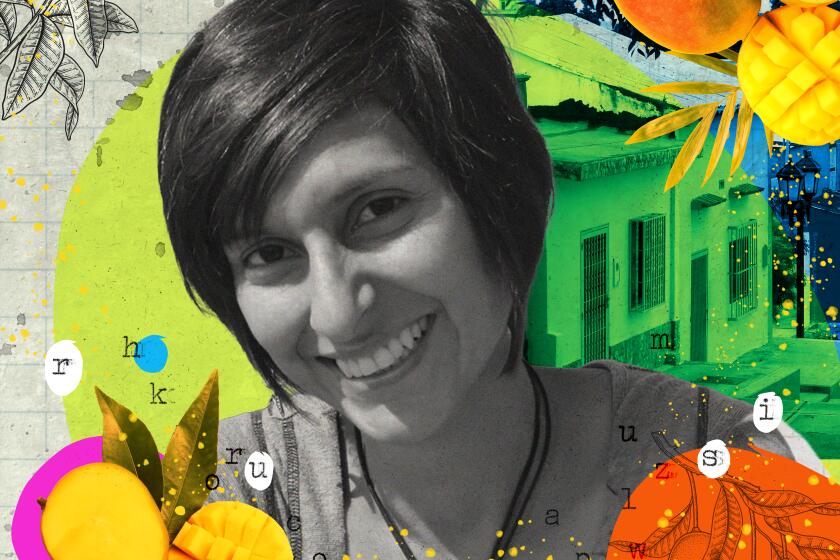Lamott’s hope-filled faith is showing
This is a paperback reissue of an Anne Lamott novel first published in 1985 by North Point Press. For fans who missed it the first time around, “Joe Jones” is a time capsule that shows the author developing the style and themes that have won her fame for “Traveling Mercies,” “Operating Instructions” and “Hard Laughter.” And for readers unfamiliar with Lamott’s unique blend of bohemianism and spirituality, it isn’t the worst of introductions.
“Joe Jones” opens somewhat misleadingly. Lamott announces the scene of most of the action to be Jessie’s Cafe, on the Marin County shore of San Francisco Bay, “a restaurant from another era, the sort of broken-down waterfront dive one might expect to find in Steinbeck or Saroyan.” Never mind the question of how a “dive” could survive in such a pricey and gentrified neighborhood. William Saroyan’s and John Steinbeck’s greasy spoons and watering holes were backlit by catastrophes in the larger world: the Armenian diaspora, the Depression, World War II. But the larger world hardly exists in “Joe Jones.” The pains and addictions that beset Lamott’s characters here are purely individual: wine and speed and cocaine, hunger for a seemingly absent God, the illness and death of close friends, star-crossed love affairs.
Jessie’s isn’t a whorehouse, like the Bear Flag in Steinbeck’s “Cannery Row” and “Sweet Thursday.” Nor is it a bar, though it serves liquor. It’s an actual cafe, with mouth-watering food, where old ladies -- including Jessie, the owner, who is 79, and her best friend, Georgia, an “empress dowager” who, for unexplained reasons, never says a word -- can feel safe and small children are welcome. It’s a ramshackle place, perhaps, but it’s cozy.
The title character, a 35-year-old basketball coach, drifter and hypochondriac, has cheated on his longtime lover, Louise, the cook at Jessie’s. When the novel begins, he is in Hawaii, living off his detached but wealthy mother and charming her bridge club friends. He and Louise miss each other terribly, but they hesitate to start up again -- they no longer trust each other or themselves. Joe’s letters to Louise -- who is 40-ish, “somewhere on the cusp between curvaceous and fat,” and the most God-hungry character of all -- are commented on witheringly by Jessie’s gay grandson, Willie, the pastry chef, who blames Joe not just for hurting Louise but for betraying the whole cafe “family.”
Joe eventually closes the physical distance between him and Louise: He moves back to San Francisco and often crosses the Golden Gate to visit Jessie’s. But the emotional distance is harder to bridge. It often seems as if the two are standing on different tectonic plates, waiting for geological forces to bring them together. Meanwhile, other things happen; as in Barry Gifford’s “Wild at Heart,” the simple, main story is barnacled with a lot of smaller ones. Sweet, vulnerable, drug-tempted Willie loses a lover. Jessie has a heart attack and dies. Louise brings in a new patron, science teacher Eva Deane, much as she would rescue a stray cat, and discovers that Eva has a terminal disease.
Coping with all this, Louise believes, makes God a necessity, whether he really exists or not. Lamott’s brand of Christianity is about the least punitive imaginable. Jessie tells Louise: “Stop trying to be your own savior. Give it up to God.... It gets you off the hook, and it puts God on the hook, where He belongs.” Self-knowledge is hell enough. Even Joe, at odd moments, “cannot find one real ray of caring in himself,” and Louise is tortured by the conviction that she doesn’t actually love anyone -- she just loves the image of herself as the heart and soul of Jessie’s, keeping all the others afloat with cream puffs and kisses, sage advice and wisecracks. She, like Joe, is nothing more than “a psychopath who’s made a reasonable adjustment.”
“Joe Jones” isn’t flawless. The constant religious nudges and the 12-step-recovery jargon grow tiresome, the structure is loose and not all the minor characters work. But even in this early novel, Lamott gives us dead-on and very funny dialogue, beautifully crafted throwaway flashbacks, descriptions of nature (the bay, birds, sea lions, fog, stars) that reflect her people’s shifting internal weather, images that make us sit up and smile (Jessie’s voice “has a lovely silvery rustle to it, like birdseed going up a vacuum cleaner”) and a warmth that invites us in like the smells of cooking in a harbor-side cafe when a bitter wind is blowing off the sea.
More to Read
Sign up for our Book Club newsletter
Get the latest news, events and more from the Los Angeles Times Book Club, and help us get L.A. reading and talking.
You may occasionally receive promotional content from the Los Angeles Times.







